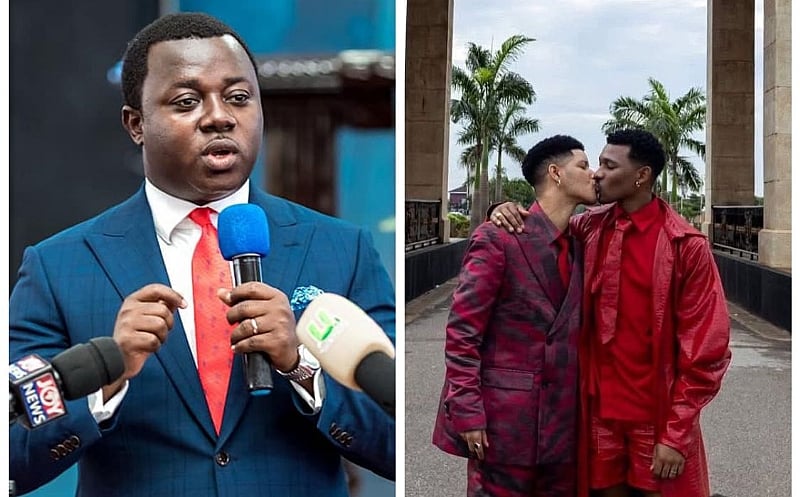The controversy surrounding two South African gay men photographed at Ghana’s national monuments has ignited a political firestorm, with accusations flying between opposing political figures. Reverend John Ntim Fordjour, a Member of Parliament representing the Assin South constituency and Ranking Member on the Defence and Interior Committee, has placed blame squarely on the shoulders of former President John Dramani Mahama and his administration. Fordjour asserts that the incident, which involved the couple posing affectionately and holding the Ghanaian flag at the Black Star Square and Independence Arch, constitutes a national embarrassment and a blatant disregard for Ghanaian values. He further criticizes the President, Minister for Tourism, Diaspora Affairs Directorate, and National Security officials for their perceived inaction and complicity in allowing such an act to occur. Fordjour argues that the Mahama administration’s alleged tolerance of LGBTQ+ issues has emboldened such displays and champions the private member’s anti-gay bill as the solution to prevent future “desecrations.”
Counter to Fordjour’s claims, Samuel Nartey George, the Minister for Communications, Digital Technology and Innovations, has pointed the finger at former President Nana Addo Dankwa Akufo-Addo. George contends that Akufo-Addo’s refusal to sign the controversial anti-LGBTQ+ Family Values Bill has signaled a permissive stance to the international gay community, emboldening them to disrespect Ghana’s cultural symbols. This contrasting perspective highlights the deep political divide on LGBTQ+ rights in Ghana and how the incident has been seized upon by both sides to further their respective agendas. The differing accusations underscore the complexity of the issue and the varying interpretations of responsibility.
The incident itself centers around photographs that surfaced on social media depicting two men, identified as South African nationals, engaging in affectionate poses at prominent Ghanaian landmarks. These images, particularly those showing the couple holding the Ghanaian flag at the Independence Arch, triggered widespread outrage amongst those who consider the acts a desecration of national symbols and a violation of traditional Ghanaian values. For many, these locations hold deep cultural and historical significance, representing national pride and identity. The act of a same-sex couple publicly displaying affection at these sites is seen by some as a deliberate provocation and an affront to the nation’s cultural sensibilities.
The ensuing debate surrounding the photographs highlights the clash between traditional values and evolving social norms. For those who condemn the couple’s actions, the incident represents a direct challenge to Ghana’s cultural fabric and its predominantly conservative views on sexuality. The public display of affection between same-sex individuals is considered taboo by many and goes against deeply ingrained religious and cultural beliefs. Conversely, others argue that the couple’s actions are an expression of personal freedom and should not be subject to condemnation or criminalization. This perspective frames the incident within the broader context of human rights and the growing global movement for LGBTQ+ equality.
The political repercussions of the incident are significant, further polarizing the already contentious debate surrounding LGBTQ+ rights in Ghana. The proposed anti-gay bill, which seeks to criminalize same-sex relations and advocacy for LGBTQ+ rights, has drawn international criticism and sparked heated debate within the country. While supporters of the bill view it as a necessary measure to protect traditional values and prevent the perceived erosion of Ghanaian culture, opponents argue that it violates fundamental human rights and promotes discrimination. The incident at the national monuments has become a focal point in this debate, with each side using it to bolster their arguments.
The incident underscores the underlying tensions and complexities surrounding LGBTQ+ rights in Ghana. It exemplifies the challenges of navigating evolving social norms within a context of deeply held cultural and religious beliefs. The accusations and counter-accusations traded by political figures further highlight the politicization of the issue, with both sides seeking to leverage the incident for their own political gain. The debate surrounding the incident ultimately reflects a broader societal struggle to reconcile traditional values with the growing push for inclusivity and equality.


